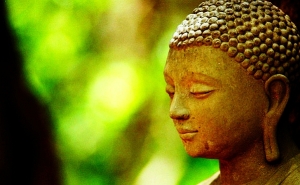Taoism and Buddhism often intersect, and one of the places this happens is with the Buddhist concept of non-attachment.
Non-attachment is one of the big, important concepts of Buddhism, as one of the main teachings of the Buddha is that attachment is the source of suffering.
Now I, and maybe some of you, used to think that non-attachment was equal to non-caring. I’d think, “I know the Buddha is serene and all, and I want to be serene, but not at the cost of being an emotionless robot.” After all, not caring about something obviously means you’re not attached to it, so Buddhists clearly remained unattached to everything by not caring about anything.
With this belief I actively avoided Buddhism, and my study of Taoism slowed. I refuse to stop caring about things, after all. I want to care. I want to love my wife and my daughter. I want to think my job is worth doing well.
This is not what non-attachment means.
Non-attachment means, simply, seeing something for how it really is, rather than how you want it to be. The attachment isn’t emotional or physical; the attachment is in the control that we all try to rest over the people and things we interact with. When you’re pissed because there’s traffic and there “isn’t supposed to be traffic?” You’re only pissed because things are happening that are different from how you’ve decided they are “supposed to be.” You’re attached to your concept of the situation, and angry that the real situation doesn’t match it. Anger is a form of suffering, hence “attachment is the source of suffering.”
This is where non-attachment, real non-attachment, comes in. If we are able to let go of our perceived control over a thing, person, or situation, then not only do we see it as it really is, but we also appreciate it more because we are no longer judging it for all the things we thought it should be, but wasn’t.
I say “perceived control” because we don’t actually have any control over anything other than ourselves. We sometimes have influence over them, but never control.
Let’s go back to the traffic, like the kind I was in this morning. Nobody enjoys traffic, but one of the reasons we hate it is because it’s not supposed to be there. We didn’t plan for it, and that’s not the way our drive was supposed to go.
Now let’s say we acknowledge that we aren’t Gods, and we actually have no control over how our drive is supposed to go. We steer the vehicle, yes, but we can’t control any of the other vehicles. We don’t control road work or accidents. We don’t control weather.
Now, instead of seething at the traffic, we see that we are relatively safe, warm, and comfortable inside our vehicle (my apologies to motorcyclists stuck in traffic). We can turn on the radio. We can call someone (depending on the state/nation you live in), Life, at the moment, isn’t actually that bad. Yes, you might be late for work, but you never had any control over that, either, and if traffic makes you late for work often then you may want to consider leaving earlier. The time at which you do a thing is something that you can control.
But I ramble.
To summarize, the Buddhist concept of non-attachment isn’t about being emotionless, and it isn’t about not caring, or “giving up.” It’s about freeing ourselves from our delusions, and opening our eyes to a world far more wonderful and beautiful than we’ve given it credit for, because we’ve previously been too busy trying to pretend it’s something else.

